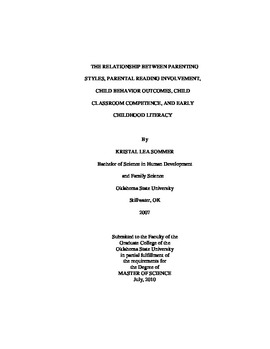| dc.description.abstract | The purpose of this study was to examine the links among authoritative, authoritarian, and permissive parenting, parental involvement in literacy activities, child classroom competence, and child behavior problems. Participants in the study included 175 three- to four-year old children attending Head Start facilities in rural Oklahoma, their primary caregivers, and their teachers. Caregivers completed the revised Preschool Behavior Questionnaire-Head Start (PBQ-HS) and a literacy involvement questionnaire. Each child was evaluated using the McCarthy Scales of Children's Abilities (MSCA). Teachers completed a modified version of The Preschool Behaviour Questionnaire (PBQ). Correlation and regression analyses tested the four hypotheses. In support of hypothesis 1(b), authoritative parenting was significantly and positively related to children's MSCA scores, before and after education and income were controlled. Contrary to hypothesis 2, authoritative parenting was not negatively related to behavior problems; instead it was significantly and positively related to children's hyperactivity, before and after education and income were controlled. In support of hypothesis 3 (moderation), results of post hoc probing revealed, first, for the high school dropout group but not for the high school graduate group, authoritative parenting is related to higher McCarthy scores. The second finding related to hypothesis 3 was not expected. Revealed by post hoc probing, authoritative parenting was related to more child relational aggression when the mothers were high school dropouts. The third finding supporting hypothesis 3, revealed by post hoc probes, was that when families' income is less than $1000 per month, permissive parenting is positively related to child aggression. Consistent with hypothesis 4 (mediation), ? for authoritative parenting decreased when either frequency of reading or trips to the library were entered simultaneously into the regression equation, predicting MSCA scores. However, contrary to hypothesis 4, results of the Sobel test indicated that trips to the library and frequency of reading did not significantly mediate the relation between authoritative parenting and children's MSCA scores. | |
